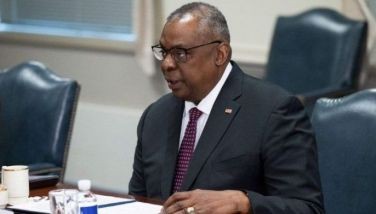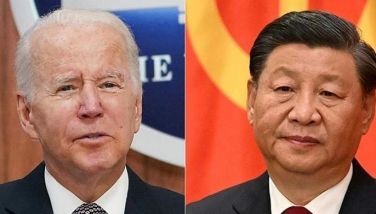Over 60 countries sign Arms Trade Treaty
UNITED NATIONS — More than 60 countries signed the landmark treaty regulating the multibillion-dollar global arms trade yesterday and the United States announced it will sign soon, giving a strong kickoff to the first major international campaign to stem the illicit trade in weapons that fuel conflicts and extremists.
The announcement by US Secretary of State John Kerry that the US — the world's largest arms dealer — will sign is critical, but the treaty's ultimate strength rests on support by all major arms exporters and importers. While the treaty was overwhelmingly approved on April 2 by the UN General Assembly, key arms exporters including Russia and China and major importers including India, Saudi Arabia, Indonesia and Egypt abstained and have given no indication yet that they will sign it.
Signatures are the first step to ratification, and the treaty will only take effect after 50 countries ratify it.
Finland's Foreign Minister Erkki Tuomioja, a key treaty backer, predicted that there will be 50 ratifications "within slightly more than a year — but the real test is, of course, getting those who still have doubts or who have not made up their minds, to sign on and ratify."
The treaty will require countries that ratify it to establish national regulations to control the transfer of conventional arms and components and to regulate arms brokers, but it will not control the domestic use of weapons in any country. It prohibits the transfer of conventional weapons if they violate arms embargoes or if they promote acts of genocide, crimes against humanity or war crimes, and if they could be used in attacks on civilians or civilian buildings such as schools and hospitals.
What impact the treaty will have in curbing the global arms trade — estimated at between $60 billion and $85 billion — remains to be seen. A lot will depend on which countries ratify and which ones don't, and how stringently it is implemented once it comes into force.
The seven co-sponsors of the treaty — Argentina, Australia, Costa Rica, Finland, Japan, Kenya and the United Kingdom — issued a joint statement at a news conference yesterday morning saying they were "heartened" that on the first day the treaty is open to signature so many countries were signing.
At the morning session, 62 countries signed the treaty. At least one more, Germany, was expected to sign in the afternoon.
"It is vital that the treaty comes into force as soon as possible and is effectively implemented," the co-sponsors said. "It is only then that the international community will have an effective tool to address the unregulated and illicit conventional arms trade that causes unspeakable human suffering throughout the world and undermines peace, security, stability and human rights."
Germany's Foreign Minister Guido Westerwelle said yesterday's event "sends a strong signal to the international community" of wide support for the treaty but stressed that "more is needed."
Australian Ambassador Peter Woolcott, president of the final treaty conference, told a news conference that "all the major exporters and importers played a highly constructive role in the negotiations ... so I'm hopeful that they will be able to sign up." Amnesty International's arms control chief Brian Wood said it understands that "China is looking positively at this treaty," but "Russia is more skeptical."
There have been some problems in harmonizing the translations of the treaty into the UN's six official languages, and Kerry said the United States looks forward to signing the document "as soon as the process of conforming the official translations is completed satisfactorily." Once that happens, the treaty would have to be ratified by the US Senate where it is expected to face an uphill struggle because of opposition from the powerful National Rifle Association.
Kerry said the treaty will require countries to implement strict international controls, similar to those already in place in the United States, to prevent the diversion and misuse of conventional weapons "and create greater international cooperation against black market arms merchants."
The Arms Trade Treaty "will not undermine the legitimate international trade in conventional weapons, interfere with national sovereignty, or infringe on the rights of American citizens, including our Second Amendment rights" to bear arms, Kerry said.
Several of the world's top arms exporters including Britain and France signed alongside emerging exporters such as Brazil and Mexico.
The Control Arms Coalition, which includes hundreds of non-governmental organizations in over 100 countries that promoted an Arms Trade Treaty, said many violence-wracked countries including Congo and South Sudan are also expected to sign in the coming weeks and months, and the coalition said their signature — and ratification — will make it more difficult for illicit arms to cross borders.
The coalition said the treaty is designed "to protect millions living in daily fear of armed violence and at risk of rape, assault, displacement and death," stressing that more than 500,000 people are killed by armed violence every year.
Anna Macdonald, the coalition's co-chair and head of arms control at the British aid agency Oxfam, said countries that sign can immediately start implementing the new standards it set, without waiting for ratification.
She predicted that all countries are going to be affected by the treaty's requirements because the arms trade is global and interdependent, and there will be pressure on non-signatory countries not to violate the new international norms.
The treaty covers battle tanks, armored combat vehicles, large-caliber artillery systems, combat aircraft, attack helicopters, warships, missiles and missile launchers, and small arms and light weapons.
In considering whether to authorize the export of arms, a country must evaluate whether the weapons would be used to violate international human rights laws or employed by terrorists or organized crime. A country must also determine whether the weapons would contribute to or undermine peace and security.
In addition, the treaty requires countries to take measures to prevent the diversion of conventional weapons to the illicit market.
- Latest
- Trending



























